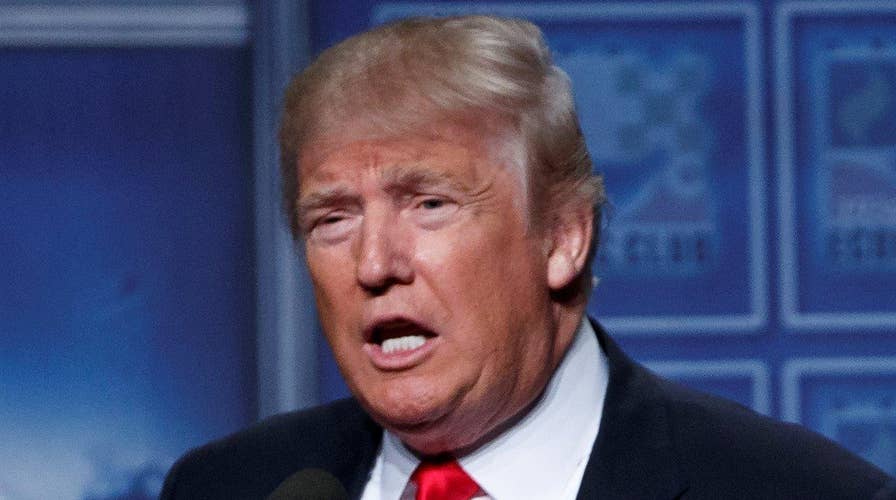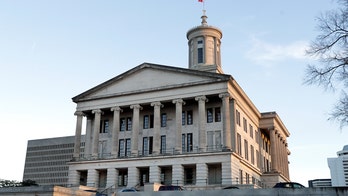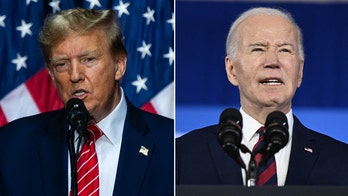Trump: No business to pay more than 15% of income in taxes
Republican nominee outlines his plan to grow the U.S. economy
Donald Trump vowed Monday to "jumpstart" the U.S. economy by cutting taxes and regulation and unshackling the American energy industry -- as he touted an economic plan he called a "night-and-day-contrast" with the “job-killing, tax-raising, poverty-inducing Obama-Clinton agenda.”
“We have begun a conversation about the great economic recovery of America,” Trump said in Detroit, which he described as a once-thriving industrial city destroyed by failed Democratic Party policies. He used the address to not only unveil a new version of his economic plan but draw a stark contrast with rival Hillary Clinton's approach.
“Detroit is a living, breathing example of my opponent’s failed economic policies,” said Trump, arguing bad international trade deals like NAFTA have resulted in record unemployment for the city and made a “total disaster” of the entire U.S. economy.
“Detroit is still waiting for Hillary Clinton’s apology,” he continued.
In a speech received with subdued applause and repeatedly interrupted by protesters, Trump vowed to create 500,000 jobs annually in the first seven years of his administration, while cutting business taxes and reducing federal regulations -- with hopes of resetting his presidential campaign in the process.
Trump also touted his plan to eliminate the estate tax, put a moratorium on new federal regulations and reduce the corporate tax rate from 35 percent to 15 percent, in his speech at the Detroit Economic Club.
He also said he wants to simplify the tax code with the GOP-led House proposal of reducing the number to tax brackets from seven to three -- 12, 25 and 33 percent.
“Detroit, the Motor City, will come roaring back,” Trump said.
He also vowed to re-negotiate the decades-old North American Free Trade Agreement and warned that Clinton, if elected, would enact the Obama administration’s Trans Pacific Partnership, which critics argue would create even more disadvantages for the United States in international trade.
“We cannot let her win because that will be disaster for Detroit and everybody else,” Trump said. “Hillary Clinton’s Trans Pacific Partnership will be even bigger and even worse than NAFTA.”
Clinton says she opposes the TPP in its current form.
In an appeal to unemployed steel workers, miners and other blue collar workers whom Trump hopes to win over in Rust Belt states, the GOP nominee also vowed to end federal regulations that have throttled coal plants and eliminated jobs.
“The Obama-Clinton [agenda] has blocked jobs through anti-energy regulations,” he said. “The Obama-Clinton war on coal has cost Michigan jobs. Clinton said she will put coal miners out of business. … A Trump administration will end this war on the American worker and unleash an energy revolution that will bring vast new wealth.”
The businessman and first-time candidate hopes to steady his campaign after a rough week in which he was criticized for comments about a Muslim-American family whose son, an Army captain, was killed in the Iraq War and for temporarily withholding his endorsement of House Speaker Paul Ryan in Tuesday's Wisconsin primary.
The Clinton campaign ripped into the proposed Trump plan Monday morning, ahead of the speech, saying his tax breaks are only for the wealthy and includes no paid family leave or increase in the federal minimum wage.
“We wanted to offer a look at how a Trump presidency would cause damage to the American economy and working families,” the campaign said in a 7-point memo. “We can be certain of this because we’ve read Trump’s ‘plans,’ listened to his words, reviewed what analysts have to say about what he wants to do. And it's the only logical conclusion.”
While Trump was delivering his speech, Clinton was in the battleground state of Florida talking about jobs.
While polls have shown that voters have deep concerns about Trump's temperament and fitness for office, recent polling puts him ahead of or on par with Clinton, on whom people trust more on the economy.
She is set to deliver her own economic speech in Detroit on Thursday, which is expected to highlight her plan, if elected, to make "the biggest investment in good-paying jobs since World War II."
She has also proposed raising taxes on the highest-income earners, including a surcharge on multimillionaires, but analysts have found lower-income earners would see little change beyond measures like additional tax credits for expenses like out-of-pocket health care costs.
In his speech Monday, Trump also announced his plan to allow parents to fully deduct the cost of childcare from their taxable income. He also called again for boosting domestic energy production -- a plan his campaign estimates can add $6 trillion in local, state and federal revenue over the next four decades.
Trump also discussed new investments in infrastructure, and said further details about his overall economic plan will be released in the coming weeks.
This wasn’t the first time Trump set out his economic vision. He first unveiled his tax plan in the fall of 2015, framing it as a boon to the middle class. "It's going to cost me a fortune," he told reporters as he vowed to lower taxes across the board without exploding the deficit.
But a host of independent groups crunching the numbers soon concluded otherwise. The plan, they said, dramatically favored the wealthy over the middle class and would increase the debt by as much as $10 trillion over the next decade.
Trump had promised at the time that he would make up for lost revenue by closing a slew of loopholes. He declined to provide specifics. And a companion plan on reducing government spending, which he had promised would follow, never came.
The Associated Press contributed to this report.





